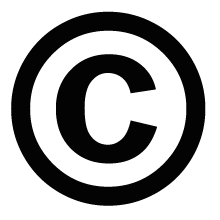
Over at The Hill comes an excellent and informative opinion piece written by Sandra Aistars, Executive Director at The Copyright Alliance .
In it, she points to the fact the head of the United States Copyright Office is thinking it might be high time to update the U.S. Copyright Law which hasn't changed since Gerald Ford was President. (For the uneducated, that would be 1976.)
Think about that for just a second. In 1976 there were no mobile phones, no mp3 players, no tablets, no real home computers except for the rich and geeky. No wifi.No Napster/Limewire/Megaupload/PirateBay. No cd's. No disks. Etc.
So yeah, it's about freaking time we figured this stuff out considering how much has changed. And good luck with it. Copyright law is broken, and it needs to be tweaked. The duration for example, (70 years under the copyright extension act) is preposterous. So too, the big old gaping hole that doesn't address the digital world.
And the sooner we do it through a proper channel the better. Unfortunately there is no utopia. And the only proper channel we have is the government. Sorry, but I do not believe in The People to make brilliant decisions. After all, The People brought us Google Adsense funded music piracy and Megaupload. In one sense The People have almost obliterated the purpose of creation, all to the tune of millions upon millions of fingertips hitting downloa while a very few get super wealthy. Ethically, everything has been thrown out the window.
More than this, I would also venture to say that psychologically the very notion of culture has been warped. We no longer see music or visual art or the written word as a fully realized valuable piece of creative. Rather, an increasingly vocal group lead by greedy lords of the digital serfdom are demanding all forms of culture be treated as a first draft to be fucked with in some bastardization of an open source model. All for free, of course. I still hold out hope that this damage isn't irrevocable.
The Aistars article is brilliant because it explains clearly and concisely why copyright exists and where the problems that have arisen from the misinterpretation (purposefully or innocently) of the law.
For the tl;dr crowd, read this paragraph:
Those skeptical of copyright protection have expended a lot of energy to redefine its language and revise its history. Calls for lessening copyright protections are far too often accompanied by heated rhetoric. Appealing to emotions may be a great way to drum up signatures for online petitions, but has no place in policy discussions. Finally, it is not hard to find examples of those who propose dramatic changes without understanding the business realities of how creative individuals and industries operate."
I have been on the receiving end of such less than cooler headed arguments for merely suggesting the ethical. Same with Dabitch. And certainly David Lowery and the Trichordist blog has had his fair share of pitchfork wielding angry villagers at his metaphorical door. I have no idea but I suspect East Bay Ray has too, or will be in the near future.
Ad hominem attacks aside, it's very difficult to argue with empirical evidence that copyright infringement is being funded by advertising and advertising platforms.
And yet, Aistars doesn't want to hang her hat completely on the almighty dollar as being the true need for such law. Despite the Freebie Jeebie crowd suggesting the notion that copyright stymies creativity, Aistars argues (correctly) the goal of copyright law is to ensure the "progress of the arts and sciences."
We don't champion government much around these parts. But I can get behind a government entity whose sole purpose is to ensure creativity flourishes by attaching an implied value and duration to a creative work. A value and term limit which, by the way, despite absurd suggestions to the contrary, the holder is allowed to revoke or ignore. So let's put away the fallacy that copyright means a band can't distribute their music for free because they can. And do. All the time. The only difference is copyright allows them that privilege, and punishes the non-creators who try to distribute it without consent.
Yeah, copyright law broken. Yeah the terms are too long. And yeah it's archaic to these digital times. It's definitely time to change it. So let's change it. Let's allow a governing body to govern, as it is their job after all. And let's hope they'll keep the parts that work and ignore the cynical money grubbing fat cats who are calling for us to to throw the baby out with the bathwater so they can keep making more and more money.
Think of it this way: When a fat cat lobbies a government with its brilliant idea, then you know it's not an idea worth keeping.
- reply
Permalink- reply
Permalink- reply
Permalink- reply
Permalink- reply
Permalink- reply
Permalink- reply
Permalink- reply
Permalink- reply
Permalink- reply
Permalink- reply
Permalink- reply
Permalink- reply
Permalink- reply
Permalink- reply
Permalink